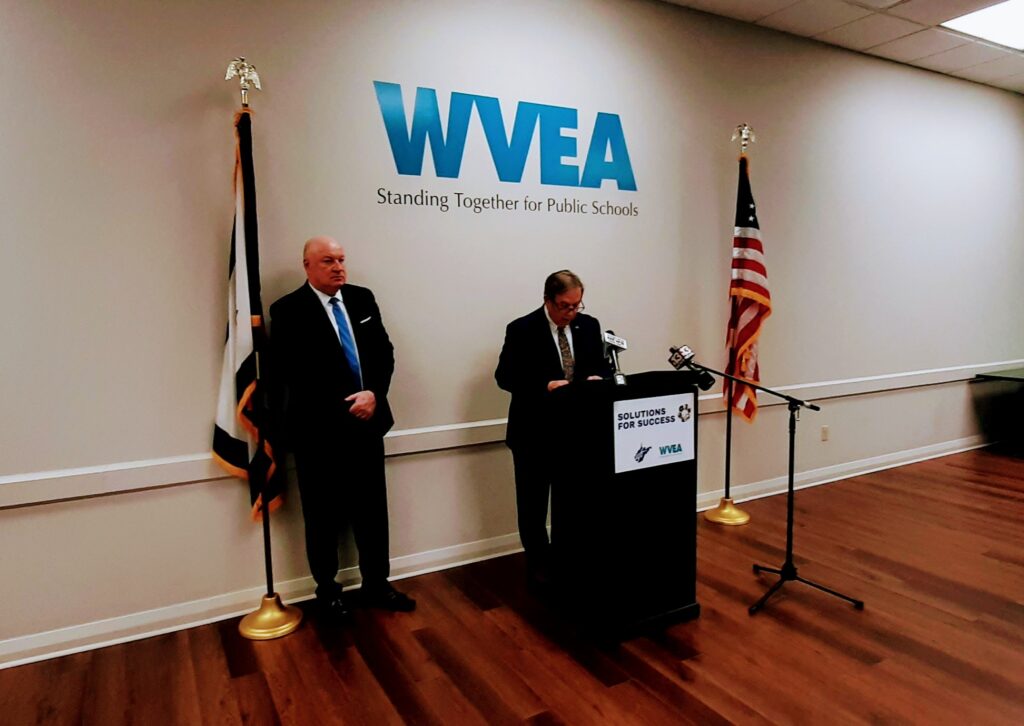The Solutions for Success focus groups were initiated in response to the most recent National Assessment of Education Progress (NAEP) test scores that ranked West Virginia near the bottom of the list.
A series of focus groups were held in Morgantown, Wheeling, Charleston, Beckley and Martinsburg.
Participants in the forum included teachers, parents, students and even a few lawmakers. Their mission: identify areas of critical need to improve educational outcomes in the state.
“We knew that this would be the first step in identifying the greatest strengths and challenges in our public schools,” said American Federation of Teachers-WV President Fred Albert.
He was joined by West Virginia Education Association President Dale Lee at a joint press conference on Wednesday.
Lee said 66 percent of respondents identified the need for more certified educators. He said more than 1,500 classrooms across the state currently operate without a properly certified teacher present and the state is losing educators to bordering states, like Virginia, for higher pay. Public school shortages are across the board and include school bus drivers, kitchen staff and other school personnel.
To resolve the teacher shortage, the focus groups called for an increase in educator pay and more funding for public schools.
“We heard the governor say in the State of the State [address] that he was proposing another pay raise. We saw the bill that moved out of the House Education [Committee] that brought beginning salaries to $44,000 and it gave an increase to our service professionals so there is some movement; now let’s get it across the finish line.”
The second highest area of concern identified by 37 percent of respondents was discipline, a problem that can lead to harassment, bullying and an unsafe environment.
Twenty five percent of focus group participants said they would like to see schools hiring more counselors, therapists and mental health support professionals. In a state where families are impacted heavily by an opioid epidemic, Lee said hiring these support staff would be the first step to help address behavioral problems.
“If we’re hiring these to address the mental and emotional needs of our students, then we can reach out to the parents and guardians and the community, Lee said. “It’s a multi-pronged mission to do this, and if we address all of those then we can make real significant progress.”
Also of high importance: community, parent and student engagement. Lee said programs like Communities in Schools are a good start but would like to see the program expanded to offer parents or guardians an opportunity to engage with educators. He said this will help parents hone skills lost over the years so they can better assist their children.
“Student achievement levels are highest when there’s a coordinated effort between the home and school environment,” Lee said.
Lee conceded that time, resources and funding are needed to make real change.
American Federation of Teachers-WV President Albert said bills in both the House and Senate that address support in early grade classrooms are encouraging. One of them includes Senate Bill 274. Titled the “Third Grade Success Act,” the bill enacts several changes to how literacy is taught from kindergarten through third grade, which is considered a crucial period for lifetime reading skills.
“If we get them early on, I like to say we are putting them in intensive care, to help them become good readers and fluent readers,” Albert said. “There’s an initiative by the state department right now, literacy initiative, that we’re both on the advisory council for. So those bills, I think, are good. They’re going to cost money, but again, it’s an investment in our students and in our future, and I think that will help with student achievement.”
Albert said he would like to see bills introduced to help fourth grade through high school seniors achieve their full potential.
In a follow up online questionnaire, student behavior was listed as one of the biggest obstacles to educational achievement.
Alternative learning placements, tutoring and remediation programs along with increased time for planning and teacher collaboration were raised, as was more time teaching time, smaller class size and less paperwork requirements. Educators also said they would like to see more respect for their profession.























